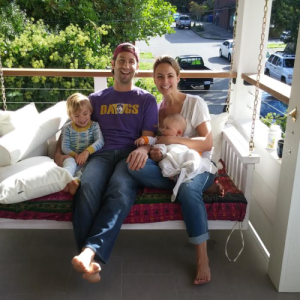
Need a cab? Hail one on your phone in under five minutes. Forgot the chilled white wine and your dinner guests arrive in an hour? Drizly to the rescue! Need a last-minute date? Swipe right. Technology has made fulfilling so many everyday needs seamless.
Well, everything except childcare. When it comes to scheduling carpools or finding a trusted driver for your child at the last minute, we’re still in the Dark Ages.
A Seattle startup is looking to change that. Pogo, a mobile app that helps parents find carpools for their kids, raised $1 million late last year in a contest sponsored by Verizon. Other startups in the child-care space are also raising money; fellow Seattle company Poppy, which helps parents arrange babysitters at the last minute, recently closed a $2 million funding round.
In part, parents' increasingly demanding schedules, plus their reliance on tech solutions for lots of other problems, is driving this trend.
“While there haven’t been many successful companies that have monetized in this space, I’m really seeing that change,” says Pogo cofounder and CEO Melissa Lehman. The former strategy consultant realized the challenges of working full time and trying to coordinate carpools for her children. “It was born out of this question I kept asking myself: ‘Why can I go online for basically anything, but not find trusted people to drive my kids?’”
There’s this perception that women don’t work as well as men once they have kids because they’re always preoccupied with finding solutions for their kids. It manifests in how they advance in the workplace.
The app, which launches in the next month, allows parents to manage and tap into existing carpools in their area, with an option to arrange for paid rides for their kids with (mostly female) vetted drivers.
It takes a village to raise a family, says Lehman, but modern America isn’t particularly conducive to building that village. “The social fabric in America is weaker than other countries,” she says. So she set out to create a virtual village, not unlike the communities we form through social networking apps.
Why this startup would make sense seems like a no-brainer for any parent, right? But Pogo’s success to date involves overcoming a particular set of start-up obstacles.

Most female entrepreneurs face insurmountable challenges while fundraising. Women raise 70 percent less money than their male counterparts. In a study of the 25 largest metropolitan areas in the U.S., Seattle ranked 10th for women entrepreneurs. Portland came in second. Seattle ranked last in a global ranking of top 20 cities for women in tech, brought down by a particularly low number of female startup entrepreneurs — just 8 percent.
For Lehman, whose company is now seeking to raise an additional $1 million, the challenges are daunting: “Look, carpooling isn’t sexy. Neither are ‘mom’ problems … but the investors in us see that the community reciprocity and social network among parents is key to this. It’s not just a one-off transaction.”
In fact, an app like Pogo could help solve a deep-seated problem in this country that is felt most pointedly by women: finding trusted yet affordable child care. In households with children under the age of 6, for every hour women spend on child care, men spend 23 minutes. In a U.S. News ranking of best countries for women, the U.S. places 13th, beaten by a plethora of countries that offer paid parental leave and high-quality, subsidized childcare. Canada is third.
That disparity has only exacerbated gender inequities in the workplace for American women. “There’s this perception that women don’t work as well as men once they have kids because they’re always preoccupied with finding solutions for their kids,” Lehman says. “It manifests in how they advance in the workplace.”
That’s why it’s encouraging to see an entrepreneur — who also happens to be a mom — changing the landscape through technology, for other working women.
Originally published by Crosscut











